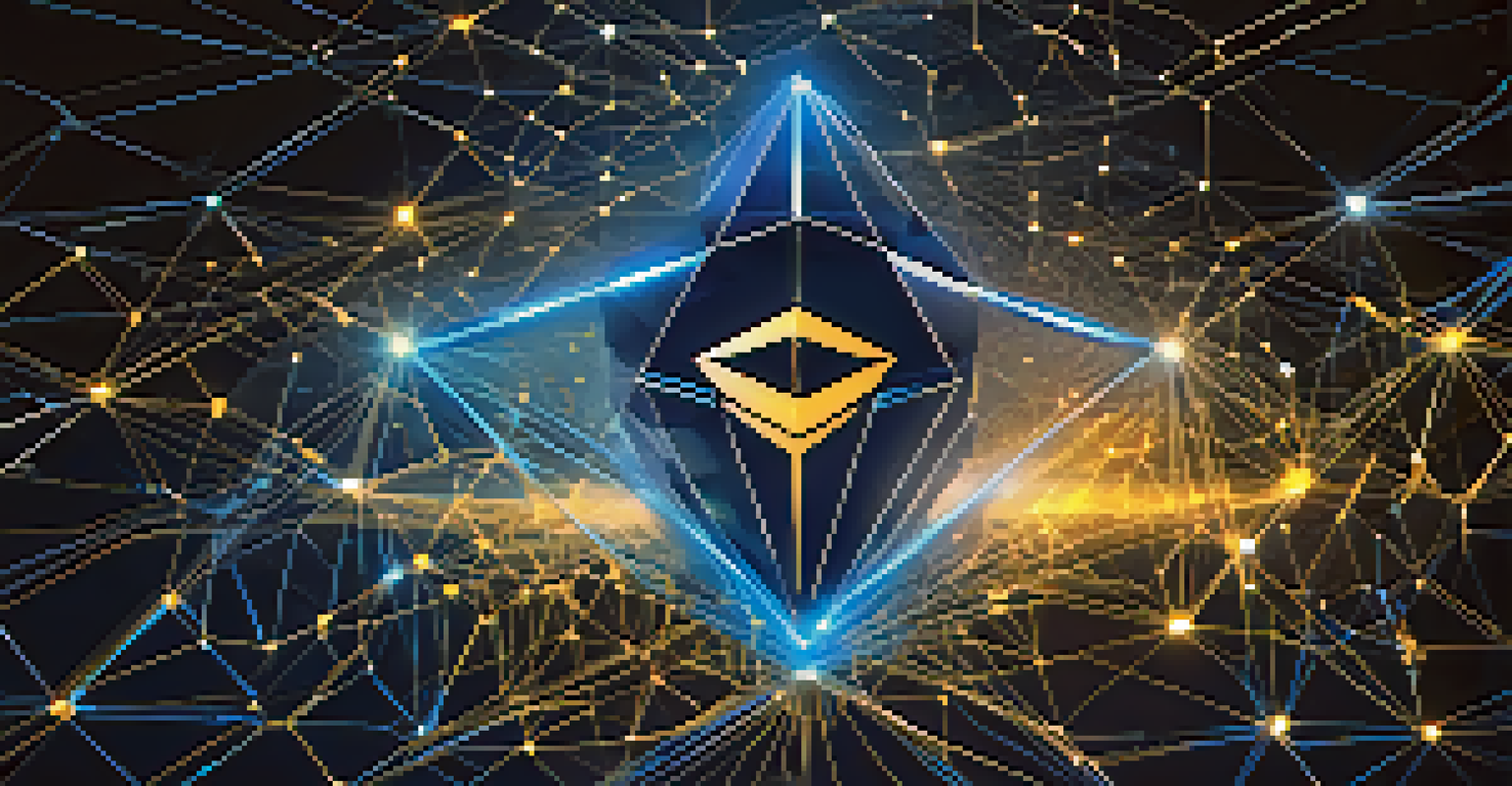The Role of Ethereum in Smart Contract Development

What Are Smart Contracts and Why They Matter
Smart contracts are self-executing contracts with the terms directly written into code. They eliminate the need for intermediaries, which is a game-changer in many industries. Imagine a vending machine: you insert money, select your item, and the machine automatically delivers it without human intervention. That’s the essence of smart contracts—they operate on trust and automation.
Smart contracts are not just a way to automate transactions; they're a way to create trust between strangers.
The significance of smart contracts lies in their ability to increase efficiency and reduce costs. By removing middlemen, transactions can be faster and less expensive. In sectors like real estate or finance, where traditional processes can be slow and cumbersome, smart contracts can streamline operations dramatically.
Furthermore, smart contracts enhance transparency and security. Once deployed on the blockchain, they cannot be altered, ensuring that all parties adhere to the agreed terms. This builds trust among users, making them more willing to engage in digital transactions.
Ethereum: The Leading Platform for Smart Contracts
Ethereum stands out as the most popular platform for developing smart contracts, thanks to its robust architecture. Unlike Bitcoin, which primarily focuses on peer-to-peer transactions, Ethereum was designed to facilitate complex applications through its own programming language, Solidity. This flexibility allows developers to create a wide range of decentralized applications (dApps).

What sets Ethereum apart is its active community and extensive documentation, which makes it easier for newcomers to get started. Developers can tap into a wealth of resources, tutorials, and forums that foster collaboration and innovation. This community-driven approach has led to a thriving ecosystem of dApps that cater to various industries, from finance to gaming.
Smart Contracts Revolutionize Transactions
These self-executing contracts automate and streamline processes, eliminating the need for intermediaries and enhancing efficiency.
Moreover, Ethereum's ongoing upgrades, such as the transition to Ethereum 2.0, aim to improve scalability and efficiency. This is crucial as the demand for smart contracts continues to grow, and Ethereum strives to maintain its leading position in the blockchain space.
How Smart Contracts Work on Ethereum
At its core, a smart contract on Ethereum operates through a series of if-then statements encoded in the blockchain. When certain conditions are met, the contract executes automatically. For instance, a smart contract in a crowdfunding scenario could release funds to a project only if a specific funding goal is reached within a set timeframe.
The future of business is blockchain, and smart contracts are the key to unlocking its full potential.
Smart contracts are deployed on the Ethereum Virtual Machine (EVM), which allows them to run on any node within the network. This decentralized execution ensures that no single entity can control the contract, enhancing security and trust. It’s a bit like having multiple copies of a recipe; even if one goes missing, others remain to keep the cooking process intact.
Additionally, Ethereum uses a unique system of 'gas' to power these contracts. Gas is a measure of computational effort, and users must pay a fee to execute transactions. This system prevents spam and ensures that the network remains efficient, allowing for a sustainable environment for smart contract operations.
Real-World Applications of Ethereum Smart Contracts
Ethereum smart contracts are already making waves across various industries. In finance, they're used for decentralized finance (DeFi) applications, allowing users to lend, borrow, and trade without traditional banks. Imagine being your own bank; that's the power of DeFi, which leverages smart contracts to facilitate complex financial transactions.
Another exciting application is in supply chain management. Companies can use smart contracts to track products from production to delivery, ensuring transparency at every step. For instance, if a shipment is delayed, a smart contract could automatically adjust payment terms, keeping all parties informed and accountable.
Ethereum Dominates Smart Contract Space
With its robust architecture and supportive community, Ethereum is the leading platform for developing diverse decentralized applications.
Moreover, the entertainment industry is tapping into Ethereum's capabilities for digital rights management. Artists can use smart contracts to ensure they receive royalties automatically when their work is used or sold. This could revolutionize how creators are compensated, putting more power back into their hands.
Challenges Facing Ethereum Smart Contracts
While Ethereum has pioneered smart contract technology, it faces several challenges that developers must navigate. One significant hurdle is scalability. As more users engage with the network, it can become congested, leading to slower transaction times and higher fees. This is particularly problematic during peak demand periods, where gas prices can spike dramatically.
Another issue is security vulnerabilities. Although smart contracts are designed to be tamper-proof, flaws in the code can lead to exploits. For example, the infamous DAO hack in 2016 resulted in a significant loss of funds due to a vulnerability in a smart contract code. This highlights the importance of rigorous testing and audits before deployment.
Lastly, regulatory uncertainty poses a challenge for developers. As governments around the world grapple with how to approach blockchain technology, the legal status of smart contracts remains murky. This unpredictability can deter investment and innovation, making it crucial for stakeholders to advocate for clear regulations.
The Future of Ethereum and Smart Contracts
Looking ahead, the future of Ethereum and smart contracts is bright, with continuous advancements on the horizon. The transition to Ethereum 2.0 aims to address scalability and energy efficiency, making the platform more attractive for developers and users alike. This upgrade could lead to a surge in dApps, further solidifying Ethereum’s dominance in the smart contract space.
Moreover, as awareness and understanding of blockchain technology grows, more industries are likely to adopt smart contracts. From healthcare to real estate, the potential for automation and efficiency is vast. This could lead to a paradigm shift in how businesses operate, moving towards more decentralized and transparent models.
Real-World Impact of Smart Contracts
From finance to supply chain management, Ethereum smart contracts are transforming industries by ensuring transparency and automation.
Finally, the integration of emerging technologies like AI and IoT with smart contracts could unlock even greater possibilities. Imagine a world where your smart home automatically executes contracts for energy usage based on real-time data. The intersection of these technologies could redefine convenience and efficiency in everyday life.
Getting Started with Ethereum Smart Contract Development
If you're interested in diving into Ethereum smart contract development, the first step is to familiarize yourself with Solidity, the programming language used for writing smart contracts. There are numerous free resources and courses available online, making it accessible for beginners. Think of it as learning the basics of a new language; with practice, you’ll be able to express complex ideas.
Next, setting up a development environment is essential. Tools like Truffle and Remix make it easier to write, test, and deploy your smart contracts. It’s akin to having a workshop where you can create and refine your projects before unveiling them to the world.

Finally, engaging with the Ethereum community can provide invaluable support and insights. Forums, social media groups, and local meetups can help you connect with experienced developers who can share tips and best practices. Networking in this space can open doors and provide the encouragement you need to bring your ideas to life.